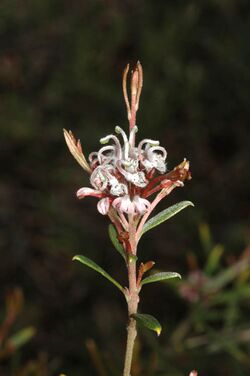Biology:Grevillea sphacelata
| Grevillea sphacelata | |
|---|---|

| |
| In the Australian National Botanic Gardens | |
| Scientific classification | |
| Kingdom: | Plantae |
| Clade: | Tracheophytes |
| Clade: | Angiosperms |
| Clade: | Eudicots |
| Order: | Proteales |
| Family: | Proteaceae |
| Genus: | Grevillea |
| Species: | G. sphacelata
|
| Binomial name | |
| Grevillea sphacelata | |
| Synonyms | |
| |
Grevillea sphacelata, also known as the grey spider flower,[2] is a species of flowering plant in the family Proteaceae and is endemic to the eastern New South Wales. It is a spreading or erect shrub with narrowly linear to oblong leaves and clusters of hairy, pale brown and pink flowers.
Description
Grevillea sphacelata is a spreading to erect shrub that typically grows to a height of 0.4–2.5 m (1 ft 4 in–8 ft 2 in) and has silky-hairy branchlets. The leaves are narrowly linear to oblong, 7–35 mm (0.28–1.38 in) long and 2–4 mm (0.079–0.157 in) wide with the edges turned down or rolled under. The upper surface of the leaves is glabrous and the lower surface is silky-hairy. The flowers are arranged in umbel-like clusters, the flowers at the ends of the clusters flowering first. The flowers are pale brown and pink, covered with greyish hairs, the pistil 9–12 mm (0.35–0.47 in) long, the style pinkish-grey. Flowering mainly occurs from July to January and the fruit is an oval follicle 18–20 mm (0.71–0.79 in) long.[2][3][4]
Taxonomy
Grevillea sphacelata was first formally described in 1810 by Robert in Transactions of the Linnean Society of London.[5][6] The specific epithet (sphacelata) means "having brown or blackish speckles".[7]
Distribution and habitat
Grey spider flower grows in woodland and heath, mainly on the Woronora Plateau but generally in the Sydney Basin and south to Dapto, west to Mittagong, with a disjunct population between Nowra, Huskisson and Wandandian on the south coast of New South Wales.[2][3][4]
See also
References
- ↑ "Grevillea sphacelata". Australian Plant Census. https://biodiversity.org.au/nsl/services/apc-format/display/63759.
- ↑ 2.0 2.1 2.2 Makinson, Robert O.. "Grevillea sphacelata". Royal Botanic Garden Sydney. https://plantnet.rbgsyd.nsw.gov.au/cgi-bin/NSWfl.pl?page=nswfl&lvl=sp&name=Grevillea~sphacelata.
- ↑ 3.0 3.1 "Grevillea sphacelata". Australian Biological Resources Study, Department of Agriculture, Water and the Environment: Canberra. https://profiles.ala.org.au/opus/foa/profile/Grevillea%20sphacelata.
- ↑ 4.0 4.1 Benson, Doug; McDougall, Lyn (1999). "Ecology of Sydney plant species: Part 7a Dicotyledon families Nyctaginaceae to Primulaceae". Cunninghamia 6 (2): 1077. https://www.biodiversitylibrary.org/item/299412#page/1093/mode/1up. Retrieved 21 February 2023.
- ↑ "Grevillea sphacelata". APNI. https://id.biodiversity.org.au/instance/apni/469907.
- ↑ Brown, Robert (1810). On the Proteaceae of Jussieu.. London. p. 174. https://www.biodiversitylibrary.org/item/13720#page/182/mode/1up. Retrieved 21 February 2023.
- ↑ William T. Stearn (1992). Botanical Latin. History, grammar, syntax, terminology and vocabulary (4th ed.). Portland, Oregon: Timber Press. p. 499.
Wikidata ☰ Q15582472 entry
 |


